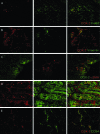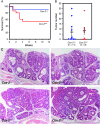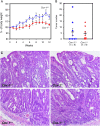Tumor formation in a mouse model of colitis-associated colon cancer does not require COX-1 or COX-2 expression
- PMID: 20061361
- PMCID: PMC2847091
- DOI: 10.1093/carcin/bgq002
Tumor formation in a mouse model of colitis-associated colon cancer does not require COX-1 or COX-2 expression
Abstract
Cyclooxygenase-2 (COX-2), a key enzyme of prostanoid biosynthesis, plays an important role in both hereditary and spontaneous colon cancer. Individuals with ulcerative colitis are also at high risk for colorectal cancer. To investigate the role of Cox-2 in colitis-associated colon cancer, we subjected Cox-2 luciferase-knock-in mice and Cox-2-knockout mice to a well-known mouse model of colitis-associated cancer in which animals are treated with a single-azoxymethane (AOM) injection followed by dextran sulfate sodium (DSS) administration. Tumors induced by AOM and DSS expressed significantly higher Cox-2 levels when compared with surrounding areas of colon, as detected both by luciferase reporter gene expression driven from the endogenous Cox-2 promoter and by western blotting of COX-2 protein in Cox-2 luciferase heterozygous knock-in mice. Immunofluorescence revealed that tumor stromal fibroblasts, macrophages and endothelial cells express COX-2 protein. In contrast, little COX-2 expression was observed in myofibroblasts or epithelial cells. Despite a significant elevation of COX-2 expression in AOM/DSS-induced colon tumors in wild-type mice, similar tumors developed in AOM/DSS-treated Cox-2(-/-)- and Cox-1(-/-)-knockout mice. These results indicate that cyclooxygenase-derived prostanoids are not major players in colitis-associated cancer. In contrast, tumor formation induced by multiple injections of AOM (with no DSS-induced colitis) did not occur in Cox-2(-/-)-knockout mice. Our data suggest that the mechanism of colorectal tumor promotion in colitis-associated cancer differs from the mechanism of tumor promotion for hereditary and sporadic colorectal cancer.
Figures






Similar articles
-
Cysteinyl leukotriene receptor 1 facilitates tumorigenesis in a mouse model of colitis-associated colon cancer.Oncotarget. 2017 May 23;8(21):34773-34786. doi: 10.18632/oncotarget.16718. Oncotarget. 2017. PMID: 28410235 Free PMC article.
-
Modeling colitis-associated cancer with azoxymethane (AOM) and dextran sulfate sodium (DSS).J Vis Exp. 2012 Sep 11;(67):4100. doi: 10.3791/4100. J Vis Exp. 2012. PMID: 22990604 Free PMC article.
-
Short-chain fatty acids administration is protective in colitis-associated colorectal cancer development.J Nutr Biochem. 2018 Jul;57:103-109. doi: 10.1016/j.jnutbio.2018.03.007. Epub 2018 Mar 17. J Nutr Biochem. 2018. PMID: 29694938
-
Dextran sulfate sodium-induced colitis-associated neoplasia: a promising model for the development of chemopreventive interventions.Acta Pharmacol Sin. 2007 Sep;28(9):1450-9. doi: 10.1111/j.1745-7254.2007.00695.x. Acta Pharmacol Sin. 2007. PMID: 17723178 Review.
-
Murine Model for Colitis-Associated Cancer of the Colon.Methods Mol Biol. 2016;1438:245-54. doi: 10.1007/978-1-4939-3661-8_14. Methods Mol Biol. 2016. PMID: 27150094 Free PMC article. Review.
Cited by
-
Mushroom Ganoderma lucidum prevents colitis-associated carcinogenesis in mice.PLoS One. 2012;7(10):e47873. doi: 10.1371/journal.pone.0047873. Epub 2012 Oct 30. PLoS One. 2012. PMID: 23118901 Free PMC article.
-
Effect of fish oil on levels of R- and S-enantiomers of 5-, 12-, and 15-hydroxyeicosatetraenoic acids in mouse colonic mucosa.Nutr Cancer. 2012;64(1):163-72. doi: 10.1080/01635581.2012.630168. Epub 2011 Dec 9. Nutr Cancer. 2012. PMID: 22149144 Free PMC article.
-
Cancer-stimulated mesenchymal stem cells create a carcinoma stem cell niche via prostaglandin E2 signaling.Cancer Discov. 2012 Sep;2(9):840-55. doi: 10.1158/2159-8290.CD-12-0101. Epub 2012 Jul 3. Cancer Discov. 2012. PMID: 22763855 Free PMC article.
-
Cysteinyl leukotriene receptor 1 facilitates tumorigenesis in a mouse model of colitis-associated colon cancer.Oncotarget. 2017 May 23;8(21):34773-34786. doi: 10.18632/oncotarget.16718. Oncotarget. 2017. PMID: 28410235 Free PMC article.
-
Novel non-cyclooxygenase inhibitory derivatives of naproxen for colorectal cancer chemoprevention.Med Chem Res. 2014 Sep;23(9):4177-4188. doi: 10.1007/s00044-014-0979-z. Med Chem Res. 2014. PMID: 27559271 Free PMC article.
References
-
- Farrow DC, et al. Use of aspirin and other nonsteroidal anti-inflammatory drugs and risk of esophageal and gastric cancer. Cancer Epidemiol. Biomarkers Prev. 1998;7:97–102. - PubMed
-
- Thun MJ, et al. Aspirin use and risk of fatal cancer. Cancer Res. 1993;53:1322–1327. - PubMed
-
- Herschman HR. Historical aspects of COX-2: cloning and characterization of the cDNA, protein and gene. In: Harris RE, editor. COX-2 Blockade in Cancer Prevention and Therapy. Clifton, NJ: Jumana Press; 2003. pp. 13–32.
-
- Herschman HR. Regulation and function of prostaglandin synthase 2/cyclooxygenase. In: Curtis-Prior P, editor. The Eicosanoids. Vol. 4. Chichester, West Sussex, England: John Wiley & Sons, Ltd; 2004. pp. 43–52.
-
- Karin M, et al. NF-kappaB: linking inflammation and immunity to cancer development and progression. Nat. Rev. Immunol. 2005;5:749–759. - PubMed
Publication types
MeSH terms
Substances
Grants and funding
LinkOut - more resources
Full Text Sources
Molecular Biology Databases
Research Materials

